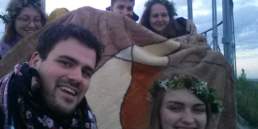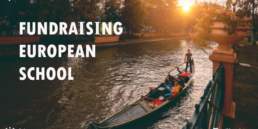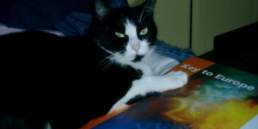No, not everyone in AEGEE welcomed the Network Commission with open arms. “Too powerful”, “a counter CD”, “too expensive”: these were the main reservations against the creation of the new body, which should serve and protect the AEGEE locals. Fears are normal when a revolution is coming. And the creation of the Network Commission exactly 20 years ago, in November 1996, was nothing else than a revolution. It made the network bigger, better and stronger. Today we cannot imagine AEGEE without the NetCom anymore. A look back.
I was excited, near a state of euphoria. It was Day 1 after my election as Network Commissioner and I was travelling home from Ankara to Györ, a beautiful provincial baroque town in Hungary, halfway between Budapest and Vienna. I took my laptop and started to type a to-do list with the tasks for the next weeks. I was also preparing a mail that I wanted to send to every one of my more than 20 locals. I just couldn’t start to work for my region.
Back in Györ I realised that two of my antennae did not have e-mail: AEGEE-Oradea and AEGEE-Timisoara. It was the 3rd of November 1997 and the Internet had not reached every corner of Europe yet. So I took the phone and called the presidents of the two locals personally, introducing myself to them, asking them how their locals are doing and that I would be always there for them. Both antennae told me that they had recruiting days coming up in the following week, so I told them that I would visit them both.
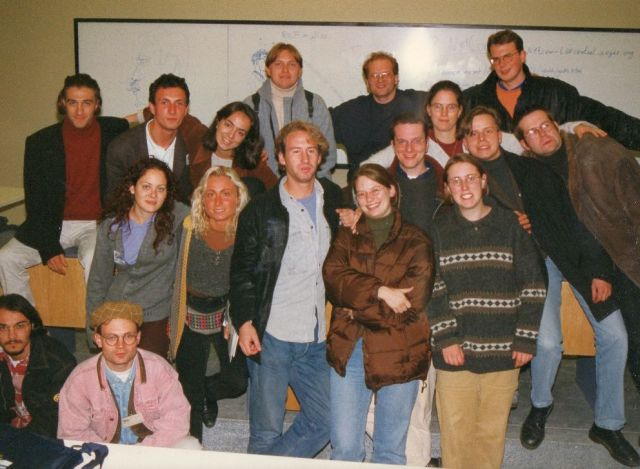
Culture shocks
Being a Network Commissioner did not only mean to serve and protect the locals, it was also a lesson in how diverse the network is and how different antennae worked. Especially the visit to Oradea, a Romanian city right next to the Hungarian border, was a culture shock. AEGEE-Oradea was unlike every antenna I had ever seen. They had 60 members, but could have easily hundreds. The association was the dominant student force in town, they were even running a photocopy shop on behalf of the university, they had countless projects and a ratio of 80% to 90% active members.
Being in AEGEE-Oradea was a privilege. On the recruiting day around 60 students gathered in a university auditorium, where they had to write a knowledge test and how they imagine to contribute to AEGEE. In the next day the best of them had individual interviews with a panel of three members of the board; the recruits were guided one by one in a room, where they were asked about their project plans. It was like a tough job interview. Only the best were good enough for AEGEE-Oradea.
My visit was also a culture shock for the antennae, because I showed them photos of past events. When they saw the pictures of people in the gym, they couldn’t believe their eyes. It turned out that AEGEE-Oradea had never organised a big international event, because they were afraid that they could not offer high standards like hostel rooms or hotel rooms to foreign participants.
It was a lesson for both sides and I felt immediately, how important the Network Commission really is. The visit to Timisoara was less spectacular. AEGEE-Timisoara was an experienced antenna, they had organised a Presidents Meeting – that’s how the EPM was called back then – just one year before. However, also their new board was unaware how AEGEE worked elsewhere.
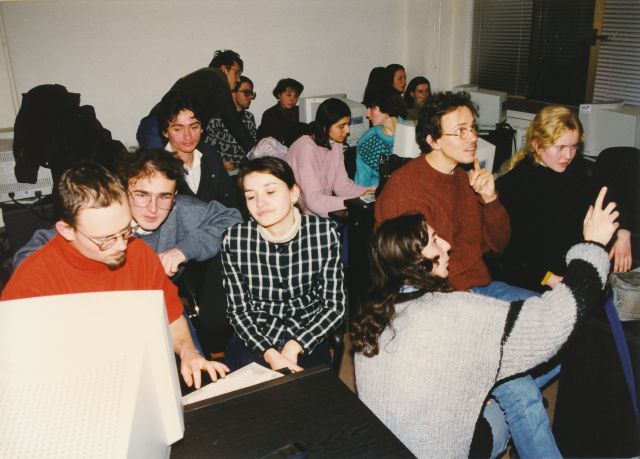
A major disruption in an association in transition
I have to confess that I wasn’t always so excited about the Network Commission. One year before, in autumn 1996 I was one of the people who saw its creation with a certain amount of scepticism. To some people the idea to create this new body looked even like a coup d’état, prepared by a small secret circle of people, ready to change the balance of power in the association. Others had concerns because they had no time to think through what this new body meant, and again others because of possible financial consequences for AEGEE-Europe. In general, it was a fear of change by a major disruption in a time where AEGEE already went through a transition.
In fact, 1996 was a year of major structural changes in AEGEE. In January the headoffice of the association had moved from Delft to Brussels – for a first time the association had an own house where the CD members could live and work together under one roof. However, this had a bad side effect. Had the members of the board of directors previously worked all over Europe and could travel around and support their network area next to their actual CD work, they were now concentrated all in one spot. Many people feared a certain ivory tower effect – a CD that would be disconnected from the network.
At the same time the CD was getting smaller. Already for a while not all 16 places could be filled. For example, the CD elected in April 1996 had only 11 members and five vacancies. For many people this was still too big, since the first headoffice did not have the capacity for so many people. Travel reimbursements for so many people was something AEGEE could not afford either, since the association now had to pay a lot of rent. Therefore a proposal was in making to reduce the number of CD members to only nine, hoping that this would be enough, since everyone would work together and harder in Brussels.
Some people however remained skeptical about this. Already some time ago a group of AEGEE strategists discussed the idea of having a CD with six members in Brussels and six people living all over Europe. However, this idea was scrapped since it would have create a huge imbalance in the team. Therefore some thinkers around rising star Bernhard Müller from AEGEE-Augsburg and AEGEE-Aachen oldie Philipp von Klitzing came up with the plan to create a new body with the task of taking care of ten different flexible network regions – the Network Commission.
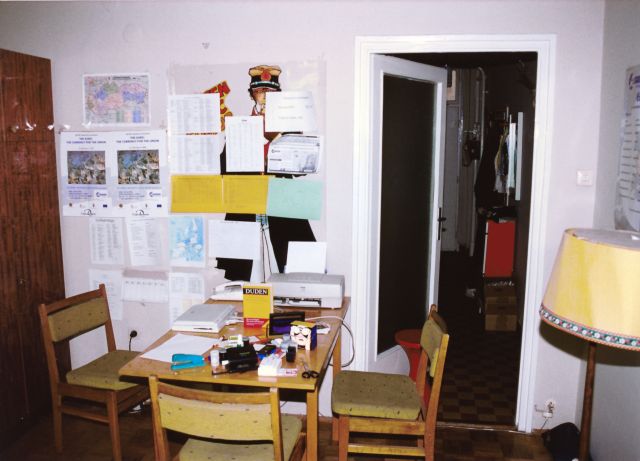
Secret planning and alternative ideas
Only a small circle of handpicked people was involved in the plan. And exactly this procedure caused some concern. Only a few weeks before the Agora Athina, at the Presidents Meeting in Timisoara in September 1996, more and more people got involved.
The Comité Directeur suspected that this new body would be something like a counter-CD and lobbied against its creation. They were afraid of the power of a body that was much closer to the people in the network than themselves. They came up with an alternative plan: to create Service Groups which would serve as knowledge hubs, for example in PR or printing matters. This new body should make the Network Commission obsolete, according to the CD’s plan.
Other members were afraid that the NetCom would be a burden for the AEGEE-Europe budget, since the original proposal foresaw some reimbursements for the Network Commissioners, who had to travel and phone a lot in a time before Skype and low-cost flights. In the end, after long discussions the delegates of the Autmn Agora Athína voted in favour of the new commission – exactly 20 years ago, on 11th of November 1996. With one major reservation: the NetCom, who needed to travel a lot, had to work for free, without any reimbursement. NetCom father Bernhard Müller accepted this amendment with a heavy heart, since he did not want to endanger the whole concept. Also the Service Groups were established, by the way – and cancelled a couple of years later, since the idea was a flop.
The new body starts to work
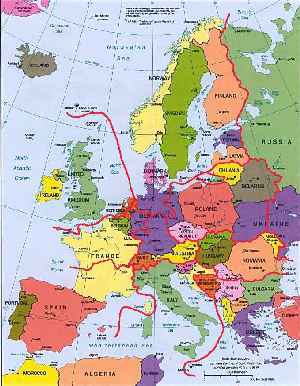
There was still half a year to go before the election of the first Network Commissioners at Spring Agora Enschede 1997. But this time was not idle: the Network Commission Implementation Team started working on the creation of the structures and internal rules of the new body. The basic idea is the same until today: to support new contacts and locals, to help antennae and contact antennae in crisis, to motivate locals to organize local and international events, to improve their structure, to foster knowledge transfer between locals, to be a bridge between Comité Directeur and locals, to show members what they can do on European level – and to organize Network Meetings, which were called Regional Meetings from 1997 to 2006.
In Enschede the new body won the hearts and minds of many sceptical people. The candidates were some of the brightest people from the network: such as the first NetCom speaker Tim Sattler, former President from Hamburg; Agora Athina organizer and antenna President Fani Zarifopoulou; Rolf Wienkötter from Vienna, former President of AEGEE-Innsbruck; Marcin Polak from Warsaw, who knew the Polish better than anyone else, or Markus Schönherr from Passau, who was not only a huge Balkan expert, but also in the board of the governing liberal FDP party in Germany. Most of them were charismatic people with a sharp and independent mind and a big heart for AEGEE. Each of them had acquired a lot of AEGEE experience. And despite some of them being quite individualistic people, they made a great team.
Also antennae could candidate as Network Commissioners, thus creating a lesser workload for the individuals and the advantage of being able to use office resources to some extent. The team consisted of 10 people or antennae, not 11 individuals like today – the 11th person was added later, to adapt to the growth of the network.
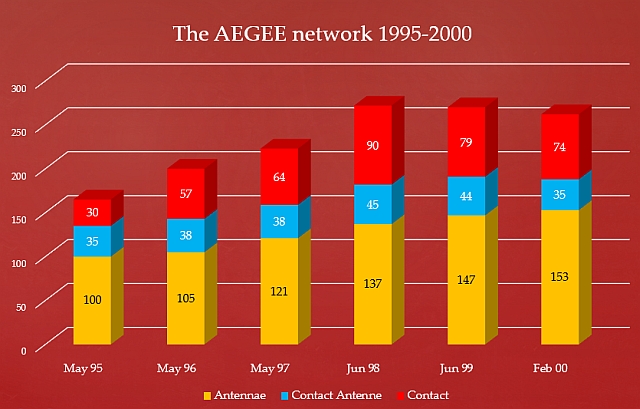
Enormous growth
After the election in April 1997 the team went straight to work. The task division was strictly regional. At the beginning of his term, NetCom speaker Tim Sattler took a map of Europe and divided the continent in ten clearly separated zones, called regions. These area were not fixed borders, they were to be reevaluated every year according to the living places of the Network Commissioners. However, later this concept became forgotten and the regional borders started to remain – until 2006 all regions were abolished and the word itself became a forbidden word. That’s why we talk about “networks” or “areas” or even “locals assigned to XY” today, avoiding the word “region”.
The network growth, which started in 1997, was incredible. In April 1997 the network had 121 antennae, 38 contact antennae and 64 contacts. One year later there were 16 antennae, 7 contact antennae and 26 contacts more! A very popular measure of these early times era were network trips, where Network Commissioners toured to universities without AEGEE together with other experienced people and created new contacts. There was time for that, because the administrative workload for each Network Commissioner was a lot less than today. For example, instead of forcing locals to send monthly reports there was only one report per semester; and that was a standard form with two pages.
Different from today, there were far less antenna criteria. A local had to pay a fee, make annual board elections and organize an international event at least every two years – those were the main criteria. The NetCom did not have to monitor “Active Communication” by writing down exactly whether the monthly report was sent within one week of the scheduled date – and neither had the NetCom to assign full points or minus points for that.
First and all the Network Commissioners saw themselves as the protector of the network, the friend of the locals – because for them the network came first. No wonder, that in 2002 NetCom speaker Davide Calenda from Venice was suggesting the motto “To serve and protect”, which is still used today. He also created the slogan “Fuck the CD, fuck the Academy” when it came to NetCom work, because he wanted to spare the locals from too many administrative or organizational burdens.
The only monthly reports were those written by the Network Commissioners about their region. Since neither Skype, Hangouts nor even simple chat programs existed, all communication in the team was done via e-mail in the late 90ies. The only chat channel in existence was IRC, but since this worked often with big delays of up to 30 seconds for some people, it was not suitable for us for online discussions.
The whole team was meeting twice per year, aside from the Agoras. One of these NetCom meetings took place in Brussels, in order to discuss matters also with the CD, the other one was hosted by a local or a NetworkCommissioner somewhere in Europe. And these NetCom meetings were legendary, with long discussions and even bigger fun.
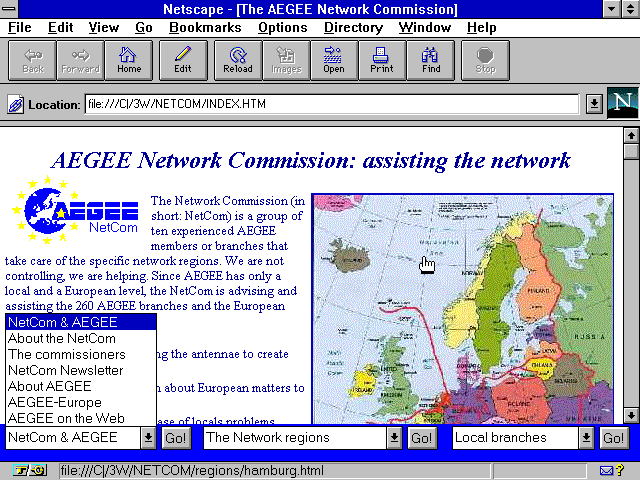
Stepping up
I was very happy when Markus Schönherr asked me to be his Subcommissioner for Hungary after Agora Enschede. The concept of Subcommissioners was introduced right from the start, strictly with a regional task. Usually there was a maximum of one SubCom per country. We were both from Germany, but while Markus studied in Germany, I lived in Hungary. So I took over the support for the locals in the country. Markus had enough on his plate, because aside from Hungary also locals from Romania, Moldova and Serbia belonged to his region.
It felt great to be part of the very first NetCom team, to be the first point of support for the locals and to dicuss with Markus on a constant basis. It gave me a strong sense of purpose, better than being in the CD in the year before, which had rather been an unpleasant experience.
Half a year later the CD was looking for a new Treasurer and Markus decided to take up that job, combining it with the Network Director tasks. This decision came quite late, so at the beginning of Agora Ankara, during a meeting of the whole NetCom team, it was discussed who should take over Markus’ job. There were two options on the table: Calin Haiduc, who was Markus’ Subcommissioner for Romania, and me. I was happy to see that the other NetCom members wanted me to take over. My condition: I wanted to have the three Slovak locals too, because I lived close to the border to Slovakia and was in better contact with them than Marcin Polak, who took take care of the biggest region – stretching from Eastern Germany to Belarus. I received 93% of the Agora votes. That wasn’t so hard being unopposed, but it felt good anyway.
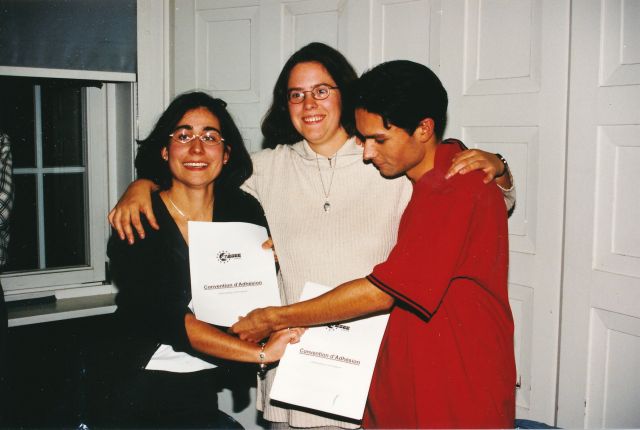
Motivation and trouble-shooting
The biggest fun of the job was motivating people. In January 1998, two months after my election, Markus and I made a great trip together from Budapest to Chisinau, with a lot of stops, motivating five antennae on the way to organize Summer Universities. However, the original reason for this trip was rather unpleasant. The Vice-President of AEGEE-Chisinau had written a letter in which he accused the President of not holding elections, moreover he told us that there were financial irregularities of their Summer University in 1997: the antenna president had invited friends over to the SU, who took part without paying – thus three days before the event there was no money anymore in the cashbox.
Markus and I ordered the President of AEGEE-Chisinau to hold new board elections that we would personally oversee. For us it was a great occasion to visit Moldova – being in the NetCom really broadened the horizon. However, when we arrived the whole local Agora was a farce. The President resigned and handed over the task to the Vice-President, everyone was happy and smiling – except for the Treasurer, Veronica Miron, who told us that this was just a theatre play and nothing would change in the antenna. In fact, she was right – and one year later AEGEE had to shut down the local for using AEGEE as a travel agency which organized bus trips to big events. The board members earned thousands of Euros with this. Fortunately some great new members were already on stand-by, who created today’s great AEGEE-Chisinau.
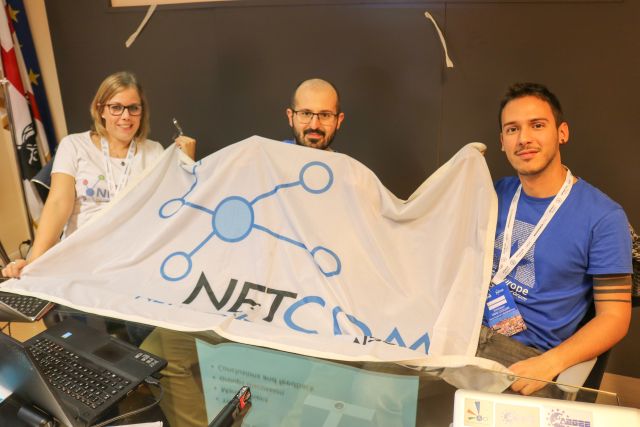
Hostile takeover in Serbia
Another earthquake in my region happened in Novi Sad. The great local, founded in November 1995, wanted to register finally with the local authorities. However, the Vice-President of the local stole the papers from the computer of the President and handed them in himself – with a different list of board members and him as president. When the real president went to the authorities in order to register, she found out that she was too late.
In parallel the fake president had sent the names of his fake board to the AddressBook Coordination team, which forwarded the board changes to the Network Commissioners. I was surprised to see the board change and wrote a mail to the real president: “Jasna, what happened? Why did you resign?” Within an hour she wrote back: “I did what?” Then the whole situation exploded. Jasna called for an extraordinary local Agora, I was talking to her and the opposition and witnessed how the fake president and his friends were excluded from the AEGEE-Novi Sad.
Meetings and training
Also organizing Regional Meetings was part of the NetCom work. The first one I organized was right after the Chisinau trip in Iasi. Six weeks later I was trainer at the Regional Meeting of Marcin Polak in Cracow. The Network Commissioners supported each other where they could; my closest cooperation was with Rolf Wienkötter from Vienna, who lived just a train-ride of 90 minutes away. Together we helped to set up AEGEE in Graz or were promoting AEGEE at the biggest university fair in Austria. In a time when the Academy did not exist yet, we also tried to improve the trainings for locals. In spring 1998 I organized a Summer University Organisers Meeting (SUOM) in Veszprém, close to the Balaton Lake – which was a SUPS, long before the concept became popular.
It was very hard to let go off the task of Network Commissioner, but I moved back from Hungary to Germany. It made no sense to continue. Looking ack, it was the best task I ever had in AEGEE. Most Network Commissioners will probably tell the same. Nothing feels so rewarding as helping the network, while being in so close contact.
May the Network Commission live forever. To serve and protect!

